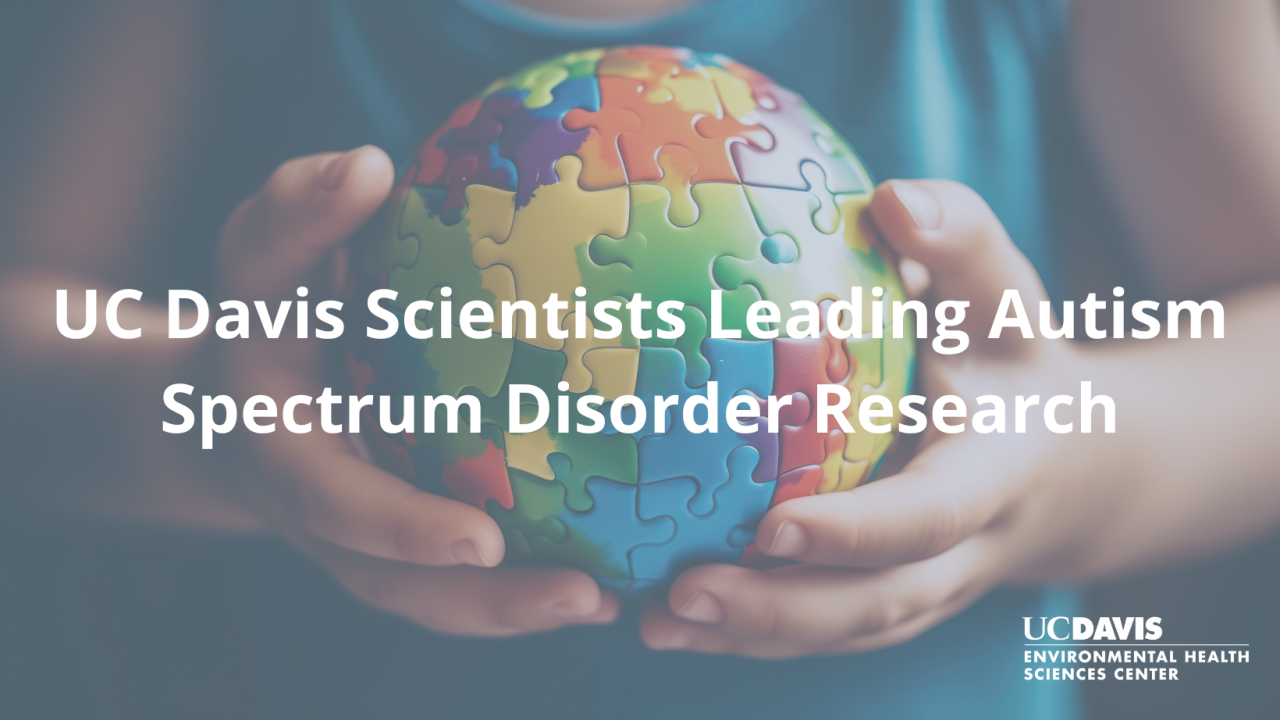
UC Davis EHSC Center Members Leading Autism Research
Learn about potential causes, new findings, and risk factors for autism spectrum disorder, and explore groundbreaking studies from Dr. Hertz-Picciotto, Dr. LaSalle, Dr. Schmidt, and Dr. Van de Water.
This April, in honor of Autism Awareness Month, we want to spotlight our members’ research on autism. In a recent report, the CDC estimated that 1 in 36 children in the U.S. are diagnosed with autism spectrum disorder (ASD). ASD is a complex and multifaceted condition that affects communication, social interaction, and behavior. While the exact cause of autism is not yet fully understood, research has identified a number of potential genetic and environmental risk factors.
Many of our EHSC (Environmental Health Sciences Center) scientists lead or participate in major studies of ASD in collaboration with researchers nationwide. These studies include:

MARBLES (Markers of Autism Risk in Babies – Learning Early Signs)
MARBLES follows mothers throughout and after their pregnancies, allowing the researchers to obtain information about the pre-natal and post-natal environment to which the baby is exposed. By gathering information in real-time, the researchers are able to increase the accuracy of the information collected. They will be able to understand better possible pre-natal and post-partum biological and environmental exposures and risk factors that may contribute to the development of autism by collecting data in this format.

CHARGE, CHARGE II, ReCHARGE (Childhood Autism Risks from Genetics and the Environment)
The CHARGE study was the first comprehensive population-based study of environmental factors contributing to autism. The study began in 2002 and addressed a wide array of environmental exposures, susceptibility factors, and their interplay. It continued in 2007, addressing the possible role of exposures during the peri-conceptional, gestational, perinatal, and early childhood periods, including infections, assisted reproductive technology, medications, pesticides, brominated flame retardants, and metals. Re-CHARGE, which started in 2016, followed the original CHARGE cohort to determine environmental chemical and non-chemical stressors and resiliency factors that are associated with neurodevelopmental outcomes at ages 8-12 years (pre-adolescent) and 15-19 years (mid-to-late adolescence). In 2020, CHARGE II, began to generate a body of new results on prenatal exposures, such as pesticides, air pollution, medications, and maternal nutrition, in relation to ASD.
Irva Hertz-Picciotto
Dr. Hertz-Picciotto is the director of the EHSC and a professor in the Department of Public Health Sciences. Dr. Hertz-Picciotto has been studying autism since 2002 when she launched the CHARGE Study. A few years later, she also took a leading role in MARBLES with the goal of searching for early environmental and biological predictors of autism, starting in pregnancy.
Below are a few of of Dr. Hertz-Picciotto’s autism related publications:
- The CHARGE Study: An Epidemiologic Investigation of Genetic and Environmental Factors Contributing to Autism
- Neurodevelopmental Disorders and Agricultural Pesticide Exposures: Shelton and Hertz-Picciotto Respond
- Considering Toxic Chemicals in the Etiology of Autism
- Neonatal chemokine markers predict subsequent diagnosis of autism spectrum disorder and delayed development
- Maternal tobacco smoking and offspring autism spectrum disorder or traits in ECHO cohorts
- Environmental exposures to pesticides, phthalates, phenols and trace elements are associated with neurodevelopment in the CHARGE study
- Placental methylome analysis from a prospective autism study
- Maternal Serum and Placental Metabolomes in Association with Prenatal Phthalate Exposure and Neurodevelopmental Outcomes in the MARBLES Cohort
- Variability of urinary pesticide metabolite concentrations during pregnancy in the MARBLES Study
- Prenatal exposure to phthalates and autism spectrum disorder in the MARBLES study
Janine LaSalle
Dr. LaSalle is EHSC Deputy Director and a professor in the UC Davis Health Department of Medical Microbiology and Immunology. The LaSalle Lab focuses on studying the role of epigenetics in ASD disorders with a known genetic cause as well as ASD with unknown causes and developing biomarkers for ASD diagnoses by using non-invasively obtained tissues.
Below are a few of Dr. LaSalle’s autism related publications:
- The Comorbidity of Autism with the Genomic Disorders of Chromosome 15q11.2-q13
- Expression Changes in Epigenetic Gene Pathways Associated With One‐Carbon Nutritional Metabolites in Maternal Blood From Pregnancies Resulting in Autism and Non‐Typical Neurodevelopment
- Cord blood DNA methylome in newborns later diagnosed with autism spectrum disorder reflects early dysregulation of neurodevelopmental and X-linked genes
- Placental DNA methylation levels at CYP2E1 and IRS2 are associated with child outcome in a prospective autism study
Rebecca Schmidt
Dr. Schmidt is the co-lead of the EHSC IHFSC Core and associate professor in Public Health Sciences. Her work focuses on how the interaction of early-life exposures, genetic susceptibility, and molecular mechanisms influences ASD. She has led or co-led several epidemiologic studies, primarily focused on gestational and childhood development, including CHARGE, the B-SAFE (Bio-Apecimen Assessment of Fire Effects) wildfire pregnancy cohort, and the MARBLES study.
Below are a few of Dr. Schmidt’s autism related publications:
- Maternal periconceptional folic acid intake and risk of autism spectrum disorders and developmental delay in the CHARGE (Childhood Autism Risks from Genetics and Environment) case-control study
- Neurodevelopmental Disorders and Prenatal Residential Proximity to Agricultural Pesticides: The CHARGE Study
- Combined Prenatal Pesticide Exposure and Folic Acid Intake in Relation to Autism Spectrum Disorder
- Neonatal Vitamin D Status in Relation to Autism Spectrum Disorder and Developmental Delay in the CHARGE Case-Control Study
- Prenatal vitamins, one-carbon metabolism gene variants, and risk for autism
Check out this video where Dr. Rebecca Schmidt discusses prenatal vitamin use and autism risk.
Judy Van de Water
Dr. Judy Van de Water is the co-director of EHSC's Pilot Project Program. and a professor in the Department of Internal Medicine at the UC Davis School of Medicine. Dr. Van de Water’s focus is on the maternal immune system’s effect on ASD. The Van de Water laboratory focuses on how the mechanisms in the nervous and immune systems interact in neurodevelopmental disorders, including ASD. They have also been able to identify maternal autoantibodies that are specific to a child’s risk of developing autism.
Below are a few of Dr. Van de Water’s autism related publications:
- Identification of the antigenic epitopes of maternal autoantibodies in autism spectrum disorders
- Maternal autoantibody related autism: mechanisms and pathways
- A Prospective Study of Environmental Exposures and Early Biomarkers in Autism Spectrum Disorder: Design, Protocols, and Preliminary Data from the MARBLES Study
- Prenatal Stress and Maternal Immune Dysregulation in Autism Spectrum Disorders: Potential Points for Intervention
- An Exploratory Examination of Neonatal Cytokines and Chemokines as Predictors of Autism Risk: The Early Markers for Autism Study
- Towards a nanoparticle-based prophylactic for maternal autoantibody-related autism
Check out this video where an Autism study of maternal antibodies is explained Dr. Judy Van de Water
The prevalence of autism spectrum disorder (ASD) in the U.S. highlights the importance of ongoing research to understand the causes, risk factors, and potential treatments for ASD. UC Davis Environmental Health Sciences Center members, including Dr. Hertz-Picciotto, Dr. LaSalle, Dr. Van de Water, and Dr. Schmidt, are leading research efforts in this area. Their studies are contributing to a better understanding of the environmental and genetic risk factors associated with ASD and identifying potential biomarkers for early detection and intervention. As we recognize Autism Awareness Month, it is crucial to continue supporting research efforts that will lead to a better understanding of ASD.

Angelina is the Environmental Health Sciences Center undergraduate writer for the communications department and a student at UC Davis studying Human Development. She is an aspiring writer with a focus on science communication.